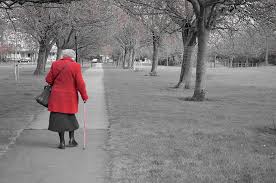
Growing Old: 6 Tips to Aging Well
As you grow older, the more you tend to asses your life: “How is my life going?”, “What is my direction in life?”, “Am I happy with my life?”, “Would I be able to retire?”This are just some of the questions you are likely to ask yourself as major changes start to happen in your life as you grow old: career transitions, children leaving home, retirement, loss of loved ones, health deterioration, loss of independence, and so on.
But how we handle these difficulties in life as we grow old would determine how we cope with old age.
We only have one life and one body during our entire life here on earth. Growing old is a part of life. This is why we should take care of our life and body as much as we can, especially as we grow old.
Here is a list of what we need to know about growing old but aging well:
Summary of “Growing Old: 6 Tips to Aging Well”:
1. Myths Associated with Health and Aging1.1 Myth: Aging Means Deteriorating Health and even Disability
1.2 Myth: Aging Means Deteriorating Mental and Memory Capabilities
1.3 Myth: Aging Means Difficulty Learning New Things
2. Coping with Change
2.1 Be Grateful
2.2 Accept That Some Things Just Happen
2.3 See the Silver Lining
2.4 Laughter
3. Finding Meaning in Life
3.1 Find Lifelong Hobbies
3.2 Traveling
3.3 Get Involved in Your Community
4. Stay Connected and Meet New People
4.1 Keep in Touch with Your Family and Friends
4.2 Try to Make New Friends
4.3 Join a Club or Any Organization
4.4 Support Groups and Medical Assistance
5. Stay Healthy
5.1 Exercise
5.2 Eat Healthy
5.3 Sleep Adequately
6. Keep a Sharp Mind
6.1 Do Brain Exercises
6.2 Try Out New Things
Final Words
The Details:
1. Myths Associated with Health and Aging
 1.1 Myth: Aging Means Deteriorating Health and even Disability
1.1 Myth: Aging Means Deteriorating Health and even Disability
Although our body deteriorates as we grow old, it doesn’t mean that so should our health. There are many old people who have managed to stay healthy and in tiptop shape by taking care of their health. Some are even much healthier than younger people.
The list of people living well over a hundred years old have steadily been growing year after year. This is due to increasing advances in medicine and the continuing increase in longevity rates globally.
1.2 Myth: Aging Means Deteriorating Mental and Memory Capabilities
Just like the rest of our body, our brain’s health also starts to decline with age. However, many old people suffer only negligible mental and memory deterioration even at a very old age.
Old people who suffer from mental and memory capabilities have brain sicknesses and not necessarily have a normal decline in mental and memory capabilities.
1.3 Myth: Aging Means Difficulty Learning New Things
Many young people have the misconception that old people are either set in their old ways or are not open to new things and experiences. However, this is untrue.
This is because the reality is that many old people would have already gained wisdom due to their age and already know that the tried and tested old ways of doing things are the most effective.
But don’t mistake this for inflexibility on the part of old people. Old people are just as willing to learn about new things and experiences as young people. If you’re already an old person, you would have already known this, but you might need to explain this to young people.
Back To Summary List
2. Coping with Change
 As you grow old, you would have to contend with changes in your life. From your children leaving your home, your first grandchildren, your first heart attack, and so on. Changes in your life can be both good and bad, usually it just boils down to perspective.
As you grow old, you would have to contend with changes in your life. From your children leaving your home, your first grandchildren, your first heart attack, and so on. Changes in your life can be both good and bad, usually it just boils down to perspective.
Here are a few tips to enable yourself to cope with changes in your life:
2.1 Be Grateful:
As you grow old, you would start to lose people in your life. Either they leave you or they die. While this is very painful, learn to accept the fact that people would leave you and even die. Be grateful that you are alive while other people are unfortunate enough to be sick or even dead.
There are many painful things in life as well. From being passed over for promotions or being the victim of sickness, calamity and even crime. Again, learn to be grateful that you are still living while others are already not.
2.2 Accept That Some Things Just Happen:
Learn to accept the fact that a lot of things in our life and even in the world itself that are beyond anyone’s control. These things can happen at any age and not just in our old age.
There is still nothing invented that can prevent calamities such as typhoons, earthquakes, hurricanes, and so on. Although you can take reasonable steps to shield yourself from crime, nothing yet has been invented that would make anyone immune to crime.
If you have been the victim of natural disasters and crimes, learn to accept the fact that these and many things in life are beyond most anyone’s control. They can happen anytime without warning.
2.3 See the Silver Lining:
Sometimes, even in the most painful and difficult situations, there is something that you can be positive about.
For example, your health might deteriorate to the point where you can no longer play your favorite contact sport like basketball. But it could be a chance for you to catch up on your reading and become smarter.
2.4 Laughter:
How often have we heard the age old phrase: “Laughter is the Best Medicine”? But this time tested saying has been proven time and time again. Many sick people have actually become healed after being introduced to laughter, and this has been medically proven.
Laughter can be the answer to painful changes in your life. Laughter makes bad feelings go away and more. It makes you more cheerful and feel refreshed.
In a study of Jews who survived the German concentration camps during world war 2, it was found that many of them would just laugh at situations in life which would make other people cry.
Back To Summary List
3. Finding Meaning in Life
 As you grow old, you would likely start to question the meaning of your life. This especially becomes very true when you realize that having a wonderful career and having plenty of money is not only the sole purpose of living your life.
As you grow old, you would likely start to question the meaning of your life. This especially becomes very true when you realize that having a wonderful career and having plenty of money is not only the sole purpose of living your life.
At this point, you might become overly spiritual and even religious as you start to think what would really happen to you when you are at the end of your life and is nearing death.
Here are a few tips to find meaning in life:
3.1 Find Lifelong Hobbies:
Finding hobbies that you would like to do for the rest of your life that can fill the empty space in your life formerly occupied by work and taking care of your children and even loved ones who have left your life.
A hobby can be anything: coin collecting, bird watching, sports, games, music, writing, and so on. Many people who are very happy about their hobbies even forget eating at times due to the sheer happiness their hobbies give them.
3.2 Traveling:
Traveling is one of the best ways to spend your life, especially if you can afford it. It could mean regularly traveling and even writing about your local and international trips to exotic places.
Seeing new places and experiencing new cultures is a great escape from the monotony of your everyday life, especially if you are already retired.
3.3 Get Involved in Your Community:
Volunteering and attending social gatherings in your community is a good way to enrich your life, especially if you are retired already.
Helping people who are in need in your community or improving your community’s well being is a good purpose in life. This also gives you the opportunity to meet and get closer to the members of your community.
Back To Summary List
4. Stay Connected and Meet New People
 One of the most common causes of depression among all people and especially old people is the feeling of isolation. This is because as people grow old, their loved ones and acquaintances either leave them or die.
One of the most common causes of depression among all people and especially old people is the feeling of isolation. This is because as people grow old, their loved ones and acquaintances either leave them or die.
Depression can cause permanent mental damage if not treated. Luckily, depression can be easily cured by being able to interact with other people, especially people whom you care and care about you.
Here are some ways you can stay connected and meet new people:
4.1 Keep in Touch with Your Family and Friends:
Your family and friends are your first lines of contact in this world, they’re already available to you without needing introductions.
Ask your family and friends to introduce you to the other people they know. This is how important and effective your family and friends could be.
4.2 Try to Make New Friends:
Remember, as you grow old, the number of your family and friends would start to lessen, especially if you are very old.
So, it just makes sense to make an effort to make new friends, despite how shy you are and how embarrassing it could be.
Try to make friends with anyone. From your new neighbor to the store clerk in your neighborhood store, potential new friends can be anyone. It could be the young boy attending school to his family.
4.3 Join a Club or Any Organization:
If directly approaching strangers with the intention of making friends with them is too overwhelming for you, join a club or any organization instead.
Clubs and other organizations usually have activities where members are given the chance to mingle and introduce themselves with the other members of the organization. Usually, members naturally warm up to each other being members of the same organization.
4.4 Support Groups and Medical Assistance:
If the feeling of isolation is really creeping in your life, you can find support and medical assistance groups who would help you cope with the feeling of isolation.
They might introduce you to people who might become your companions and even advise you on how to cope with your feeling of isolation. They might even prescribe activities and medication at times.
Back To Summary List
5. Stay Healthy
 Unfortunately, many people neglect their health until it is too late. This is why even though many people are living much longer lives, they are unhealthy for their age.
Unfortunately, many people neglect their health until it is too late. This is why even though many people are living much longer lives, they are unhealthy for their age.
People would often give out the excuse that they are either too busy or too poor to become healthy. But being healthy doesn’t need to be expensive nor time-consuming.
Here are a few tips to stay healthy even in old age:
5.1 Exercise:
A European study have found out that exercise and/or being physically active is the number one contributor to longevity. The study found out that even if you only started exercising in your senior years, it could still prolong your life.
Exercise helps increase your strength, agility, vitality and mental health no matter what age you are. It helps to stave off brain disorders like memory loss, cognitive decline and dementia.
5.2 Eat Healthy:
In a study conducted on many people who live more than a hundred years, diet was found to be a major contributing factor to their longevity.
As you grow old, you should start to eat more and more vegetables as opposed to meat and fruits. Ideally, vegetables should consist more than half your daily diet.
You should also stay away from very salty, sweet and fatty food which most junk and fast foods are. However, it is no big deal if you indulge on them very occasionally only.
5.3 Sleep Adequately:
Sleeping too long has the same harmful effect as sleeping less. Though it has been recommended that you should sleep between 8 to 10 hours a day, your main determining factor should be your health.
If you wake up still feeling sleepy and inactive, it might mean that you have too little sleep. If you wake up with a headache or nausea, it might mean that you slept too long. There is no hard and fast rule to the number of hours you should sleep. Your health determines it.
If you are finding it hard to sleep, make sure that you are in a quiet, cool and dark place which mimics the nighttime environment. Humans are naturally programmed to sleep at night, you should emulate nighttime conditions as much as you can when sleeping.
Back To Summary List
6. Keep a Sharp Mind
 Keeping a sharp mind is not easy as you grow old. This is because your brain starts to deteriorate as you grow old. Mental and memory tasks that are easy for you when you were still young, can become a challenge in old age.
Keeping a sharp mind is not easy as you grow old. This is because your brain starts to deteriorate as you grow old. Mental and memory tasks that are easy for you when you were still young, can become a challenge in old age.
Luckily, your brain is like a muscle which can be exercised. Here are a few things you can do to keep a sharp mind:
6.1 Do Brain Exercises:
Your brain becomes healthy the more you use it. The harder the mental task, the more it tends to make your brain stronger.
You can do brain puzzles, play board games and even do mentally demanding tasks like playing a musical instrument, compose, write, and so on.
A great way to sharpen up your brain would be to do away with a calculator for regular calculations and do manual calculations instead using a pen and paper.
Some people have developed their brain so much that they don’t even need a pen and paper to do manual calculations.
6.2 Try Out New Things:
Your brain becomes dull when it does monotonous things. That is why you should vary your routine as much as you can on a regular basis.
For example, you can regularly vary your route to work to expose your brain to new environments and situations. This way, when a problematic route situation happens, your brain can easily compensate for it.
This can be applied to almost anything. From the way you eat, work, sleep, walk, run, and so on; you can vary them all to liven up your day and to also keep your brain sharp.
The variations in your routine could be as subtle as picking out a new dish when you eat lunch to as something so different as trying out a new sport to play or even a new career.
The more your brain is exposed to varying environments and situations, the better it functions and processes new input.
Back To Summary List
Final Words
 Many people are unprepared for old age. They neglect the fact that as you grow old, you need to stay as healthy as much as possible.
Many people are unprepared for old age. They neglect the fact that as you grow old, you need to stay as healthy as much as possible.
People also neglect that they need to stay connected with their loved ones and friends and make new friends, otherwise they risk being isolated from society.
People especially neglect that as you grow old, your brain’s mental and memory capabilities deteriorate. That is why you should train your brain like a muscle and exercise it regularly. This can be done by doing mental exercises and trying new things which tests the brain.
Lastly, people neglect the fact that changes would happen in their life, either good or bad. The secret is to be grateful and to accept that you can’t control life.
Most importantly, you should laugh as much as you can. For laughter has beneficial effects to your health, brain and life.
Back To Summary List
You Might Be Interested To Read This Article:

Elder Orphans: Growing Old Alone with No Family- 11 Things to Consider
An Elder Orphan is a mature age person who has no immediate family in their life. They have no parents, a partner, siblings, children or grandchildren. They may have family but they are mostly inaccessible to them.
Are you an elder orphan or about to be one? Are you ready for a life growing old alone with no family? Sure, there are advantages to being alone like being able to do whatever you want without anyone stopping you.
As you become old, sickly and generally out of touch with technology, society and the rest of the world, you would need assistance from other people whether you like it or not. You should be ready to share your independence with some people as you become an elder orphan...